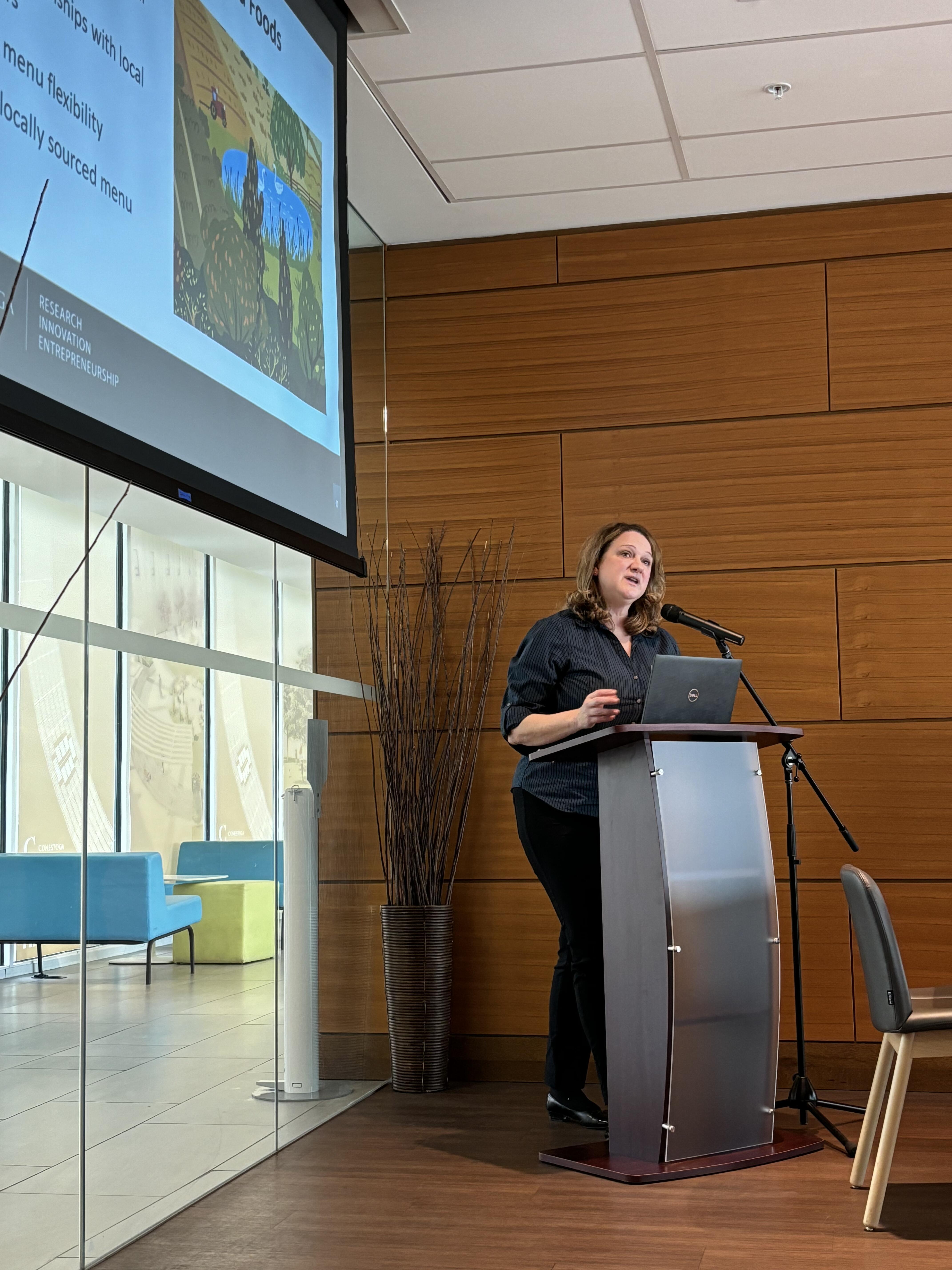The Conestoga Food Research & Innovation Lab (CFRIL) hosted a sustainability symposium to share new findings from a research project funded by Dawn Foods.

Conestoga researcher Tracy Butt speaks at a symposium about findings of a study by the Conestoga Food Research & Innovation Lab (CFRIL) into sustainability practices at local bakeries.
Sustainability in small to medium-sized bakeries was the focus of the study that employed two applied research students at Conestoga - one of the first Canadian recipients of the award from the corporate giving program of the international bakery manufacturer and ingredients supplier.
“The award from Dawn Foods Corporate Giving program provided an incredible experiential learning opportunity for two applied research students at Conestoga. Through this work, CFRIL has developed practical information to share with the bakery industry regarding how they can improve their sustainability,” said CFRIL director Nicole Detlor.
“Fostering and advancing sustainable practices in the food industry is the aim of the collaboration between CFRIL and Dawn Foods,” said Ken Weir, director of marketing for Canada.
"It’s important and it’s something we want to be involved with from the ground up and keep the momentum going,” Weir told the audience at the symposium held on October 23 in the student-run Bloom restaurant at the Waterloo campus.
Principle investigator Tracy Butt explained that the research included talking to local bakeries to understand their current practices and obstacles encountered to adopting more sustainable practices in their business, from ingredient sourcing and food waste to packaging.
“Our goal was to understand what barriers existed and if we could provide information to remove those barriers or provide opportunities to help people move forward,” Butt said.
Common barriers the researchers identified included greenwashing, which is when environmental claims are not accurate, limited supplier transparency, difficulty finding practical guidance and lack of government incentives.
“During interviews with bakery owners, it was interesting to learn about their efforts to reduce food waste, source ingredients sustainably, and choose sustainable packaging that suits their needs,” said Taylor Jarvis, one of the students who has been working on the research.
Overcoming these identified barriers to sustainability is essential as the food system contributes significantly to global greenhouse gas emissions - the scope surprising Jarvis, who is in their final year of the Bachelor of Environmental Public Health program.
“Food waste in Canada is really a massive issue. Nearly 60 per cent of all the food in Canada is lost or wasted each year. This actually has a very significant environmental impact. It is estimated that 56.5 million tonnes of carbon-dioxide equivalent is related to food waste each year in Canada.”
The message Jarvis would like people to take from the research is that sustainability is a shared responsibility, from large corporations to small businesses to individuals. “I encourage everyone to evaluate their habits. Think about your monthly water and electricity use, the food waste you produce each week, and where your food comes from. Consider the environmental impacts of food production, such as land use, transportation and packaging. With collective effort, even small changes can make a difference.”
Rob Flack, Minister of Agriculture, Food and Agribusiness, said Conestoga has a strong reputation in the agri-food industry because of forward-thinking ideas.
“All of you exemplify the Ontario spirit of innovation and optimism and the impact of your work extends far beyond your college,” said Flack in a recorded video.
“I appreciate the steps you are taking to tackle issues in the agri-food sector, especially on sustainable food production and packaging solutions,” Flack said. “It is comforting to know that institutions like yours are developing new best practices that balance sustainability and feasibility. Thank you for helping position Ontario agri-food for long-term success.”
The Conestoga Food Research & Innovation Lab meets the needs of industry through education, training, research and technical expertise. Its advanced facilities are essential in providing solutions for small, medium, and large businesses in the food and culinary sector. The focus is to work with partners to provide innovative solutions and support throughout the product development cycle, including formula development, shelf-life studies, packaging testing, and scale-up using pilot plant equipment.
